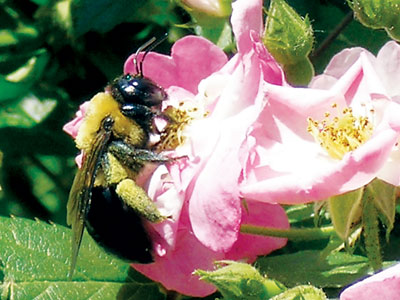All Nonfiction
- Bullying
- Books
- Academic
- Author Interviews
- Celebrity interviews
- College Articles
- College Essays
- Educator of the Year
- Heroes
- Interviews
- Memoir
- Personal Experience
- Sports
- Travel & Culture
All Opinions
- Bullying
- Current Events / Politics
- Discrimination
- Drugs / Alcohol / Smoking
- Entertainment / Celebrities
- Environment
- Love / Relationships
- Movies / Music / TV
- Pop Culture / Trends
- School / College
- Social Issues / Civics
- Spirituality / Religion
- Sports / Hobbies
All Hot Topics
- Bullying
- Community Service
- Environment
- Health
- Letters to the Editor
- Pride & Prejudice
- What Matters
- Back
Summer Guide
- Program Links
- Program Reviews
- Back
College Guide
- College Links
- College Reviews
- College Essays
- College Articles
- Back
World Buzz MAG
What do the words black, yellow, and endangered have in common? They all describe the important anthophila – more commonly known as the bee. If you didn’t already know, bees are going extinct, and their endangerment is not to be taken lightly. Though it may seem that these insects exist mainly to pose threats to annual family picnics, without bees, the human race would eventually become extinct.
Bees, along with other insects such as beetles and butterflies, are natural pollinators, meaning they initiate reproduction among plants. In fact, bees are the number-one cross-pollinators in the world. They are responsible for pollinating more than 30 percent of the food consumed globally. Alarmingly, over the past 60 years, the number of hives has been on a steady decline. In the U.S. there were 6 million hives in 1947, in 1970 there were 4 million, and only 2.5 million exist today.
So, what exactly will happen if bees continue on the path to extinction? For one, there will be a worldwide famine. Since most of our food is pollinated by bees, crops will die. There won’t be enough plant growth and reproduction to supply a world of heavy consumerism. This also will also have an effect on the water we drink. Because of the shortage in plants and trees, water retention will not occur and fresh bodies of water will dry up. Next, the lack of pollination will force humans to use more fossil fuels because we won’t have the plant resources to make biofuel. Finally, the economy will face a major global depression. In the U.S. alone, pollinators contribute more than $24 billion to the economy. On the worldwide scale, this number grows exponentially, so their extinction could spread poverty across the globe.
You may be wondering what exactly led to the endangerment of these insects, and how we can help save them. There are various causes for the decline of hive population: pesticides, parasites, urbanization, and global warming – most are the result of human activity. We’ve done a lot as a species to harm our planet, from polluting the air and causing global warming to endangering an insect vital to our own survival. It’s time we step up and help our dying ecosystems.
There are many simple ways we can save the bee population – some are doable even in your own backyard. For example, you can start a garden. It can be as small as a plant box outside your window; just make sure to plant pollinators that attract bees. Also, when taking care of these plants don’t use pesticides and herbicides; they are very harmful to the bees. These chemicals can travel long distances with a little help from the wind.
Another way you can help is to give your weeds a chance to live. Weeds are a favorite for bees to pollinate. Let them bloom and wait until they start to seed before pulling them out. Even simpler than that, you can help bees by leaving a small basin of water outside. You may not expect it, but bees get thirsty too. They appreciate a drink of water after a long day of pollinating plants and making honey.
Lastly, treat bees kindly. Although most people have a fear of getting stung, bees only attack when you bother them or their nests. In fact, honey bees die after stinging because they are unable to pull out their stinger. They are forced to leave behind their stinger along with parts of their abdomen.
Engineers at Harvard are tackling this problem by developing “RoboBees” – autonomous flying micro robots that have the potential to replace actual bees. They’re as small as a penny and their design is inspired by bees’ biology. RoboBees’ additional features – diving and swimming in water – make them even more useful than bees. These features allow them to not only pollinate plants, but provide additional services such as environmental and traffic monitoring, high-resolution weather and climate mapping, surveillance, and help with search and rescue missions.
Tiny robot insects sound downright awesome, but they cannot replace the real thing. We must spread awareness of the endangerment of bees. We need to put the “Save the Bees” campaign into full throttle before it’s
too late.

Similar Articles
JOIN THE DISCUSSION
This article has 0 comments.
